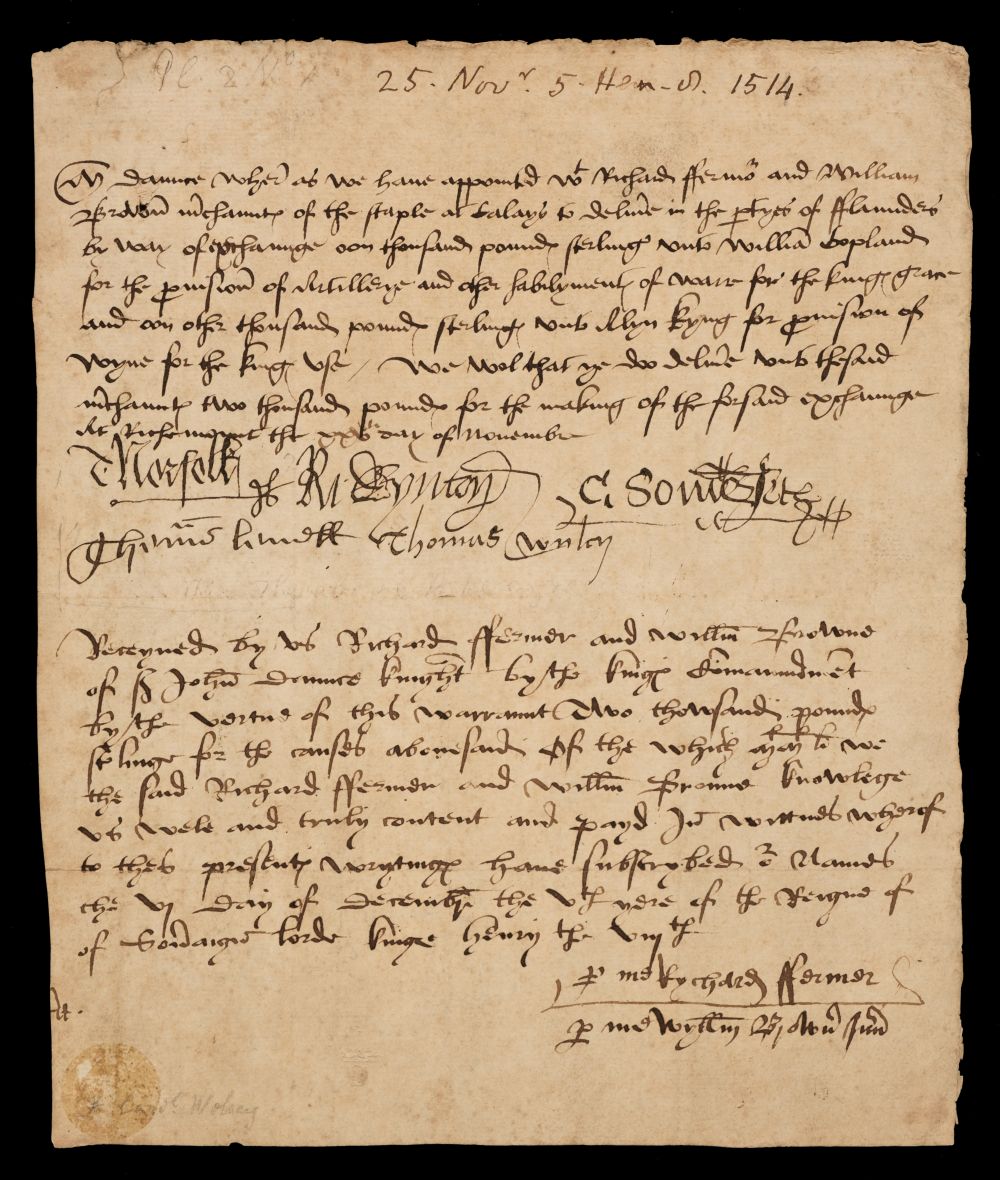DIMSDALE, Thomas J. (d. 1866). The Vigilantes of Montana, or Popular Justice in the Rocky Mountains. Being an Impartial Narrative of the Chase, Trial, Capture and Execution of Henry Plummer's Road Agent Band... Virginia City, Mont.: Montana Post Press, D.W. Tilton, 1866. 8 o (159 x 120 mm). 2-page advertisement at end (a few short tears). (Some pale dampstaining, first five lines of text on p. 5 underlined in pencil.) Contemporary brown half morocco (rebacked preserving original spine). FIRST EDITION OF THE FIRST BOOK PRINTED IN MONTANA, called by Charles Dickens "the most interesting book I ever read" (quoted in Edward Eberstadt, The William Robertson Coe Collection of Western Americana , 1948, p. 55). INSCRIBED AT THE HEAD OF CHAPTER ONE BY NATHANIEL P. LANGFORD: "Compliments of N.P. Langford." Langford (1832-1911) was a political rival of sheriff Henry Plummer and he features prominently in the case against him which is described in the book. "Owing to the peculiarly divided state of public opinion, it seemed almost impossible to select an impartial jury from the neighborhood, and therefore a messenger was sent to Godfrey's Canon, where N.P. Langford, R. C. Knox, A. Godfrey, and others, were engaged in erecting a saw-mill, requesting them to come down to Bannack and sit on the jury. Messrs. Langford and Godfrey came down at once, to be ready for the trial the next day. The assembly of citizens numbered about five or six hundred, and to them the question was put, 'Whether the prisoners should be tried by the people en masse, or by a selected jury.' Some leading men advocated the first plan. N. P. Langford and several prominent residents took the other side, and argued the necessity for a jury. After several hours' discussion, a jury was ordered, and the trial proceeded. At the conclusion of the evidence and argument, the case was given to the jury without any charge. The Judge also informed them that if they found the prisoners guilty, they must sentence them. At the first ballot, the vote stood: For death, 1; against it, 11. The question of the prisoners' guilt admitted of no denial. N. P. Langford alone voted for the penalty of death. A sealed verdict of banishment and confiscation of property was ultimately handed to the Judge, late in the evening" (Chapter VI, p. 32). Vigilante justice prevailed, with Plummer being surprised at home, walked to the town gallows with two other law officers, and hanged. Dimsdale's book concludes: "Leave us the power of the people, as a last resort; and where governments break down, the citizens will save the State. No man need be ashamed of his connection with the Virginia Vigilantes" (p. 227). Nathaniel P. Langford would later become known as "National Park" Langford for his support of the Yellowstone park project. He became the first superindendent of Yellowstone National Park and was a member of the Washburn-Langford-Doane Expedition of 1870 to explore the park. Langford also went on to write the classic Vigilante Days and Ways (see lot 332). "Perhaps no book excells [sic] Dimsdale's in presenting the picture of the lawless conditions that characterized the mining camps of the Rocky Mountain Country. The author was editor of the Virginia City Montana Post and a participant in the extraordinary campaign against lawlessness...Exceedingly rare" (Adams). "Not only the first, but textually the most important, book ever printed in Montana" (Howes). Adams Six Guns 596; Graff 1086; Howes D-345 ("b"); Montana Imprints 2; Streeter IV:2221; Streeter Americana Beginnings 72.
DIMSDALE, Thomas J. (d. 1866). The Vigilantes of Montana, or Popular Justice in the Rocky Mountains. Being an Impartial Narrative of the Chase, Trial, Capture and Execution of Henry Plummer's Road Agent Band... Virginia City, Mont.: Montana Post Press, D.W. Tilton, 1866. 8 o (159 x 120 mm). 2-page advertisement at end (a few short tears). (Some pale dampstaining, first five lines of text on p. 5 underlined in pencil.) Contemporary brown half morocco (rebacked preserving original spine). FIRST EDITION OF THE FIRST BOOK PRINTED IN MONTANA, called by Charles Dickens "the most interesting book I ever read" (quoted in Edward Eberstadt, The William Robertson Coe Collection of Western Americana , 1948, p. 55). INSCRIBED AT THE HEAD OF CHAPTER ONE BY NATHANIEL P. LANGFORD: "Compliments of N.P. Langford." Langford (1832-1911) was a political rival of sheriff Henry Plummer and he features prominently in the case against him which is described in the book. "Owing to the peculiarly divided state of public opinion, it seemed almost impossible to select an impartial jury from the neighborhood, and therefore a messenger was sent to Godfrey's Canon, where N.P. Langford, R. C. Knox, A. Godfrey, and others, were engaged in erecting a saw-mill, requesting them to come down to Bannack and sit on the jury. Messrs. Langford and Godfrey came down at once, to be ready for the trial the next day. The assembly of citizens numbered about five or six hundred, and to them the question was put, 'Whether the prisoners should be tried by the people en masse, or by a selected jury.' Some leading men advocated the first plan. N. P. Langford and several prominent residents took the other side, and argued the necessity for a jury. After several hours' discussion, a jury was ordered, and the trial proceeded. At the conclusion of the evidence and argument, the case was given to the jury without any charge. The Judge also informed them that if they found the prisoners guilty, they must sentence them. At the first ballot, the vote stood: For death, 1; against it, 11. The question of the prisoners' guilt admitted of no denial. N. P. Langford alone voted for the penalty of death. A sealed verdict of banishment and confiscation of property was ultimately handed to the Judge, late in the evening" (Chapter VI, p. 32). Vigilante justice prevailed, with Plummer being surprised at home, walked to the town gallows with two other law officers, and hanged. Dimsdale's book concludes: "Leave us the power of the people, as a last resort; and where governments break down, the citizens will save the State. No man need be ashamed of his connection with the Virginia Vigilantes" (p. 227). Nathaniel P. Langford would later become known as "National Park" Langford for his support of the Yellowstone park project. He became the first superindendent of Yellowstone National Park and was a member of the Washburn-Langford-Doane Expedition of 1870 to explore the park. Langford also went on to write the classic Vigilante Days and Ways (see lot 332). "Perhaps no book excells [sic] Dimsdale's in presenting the picture of the lawless conditions that characterized the mining camps of the Rocky Mountain Country. The author was editor of the Virginia City Montana Post and a participant in the extraordinary campaign against lawlessness...Exceedingly rare" (Adams). "Not only the first, but textually the most important, book ever printed in Montana" (Howes). Adams Six Guns 596; Graff 1086; Howes D-345 ("b"); Montana Imprints 2; Streeter IV:2221; Streeter Americana Beginnings 72.

.jpg)













Try LotSearch and its premium features for 7 days - without any costs!
Be notified automatically about new items in upcoming auctions.
Create an alert